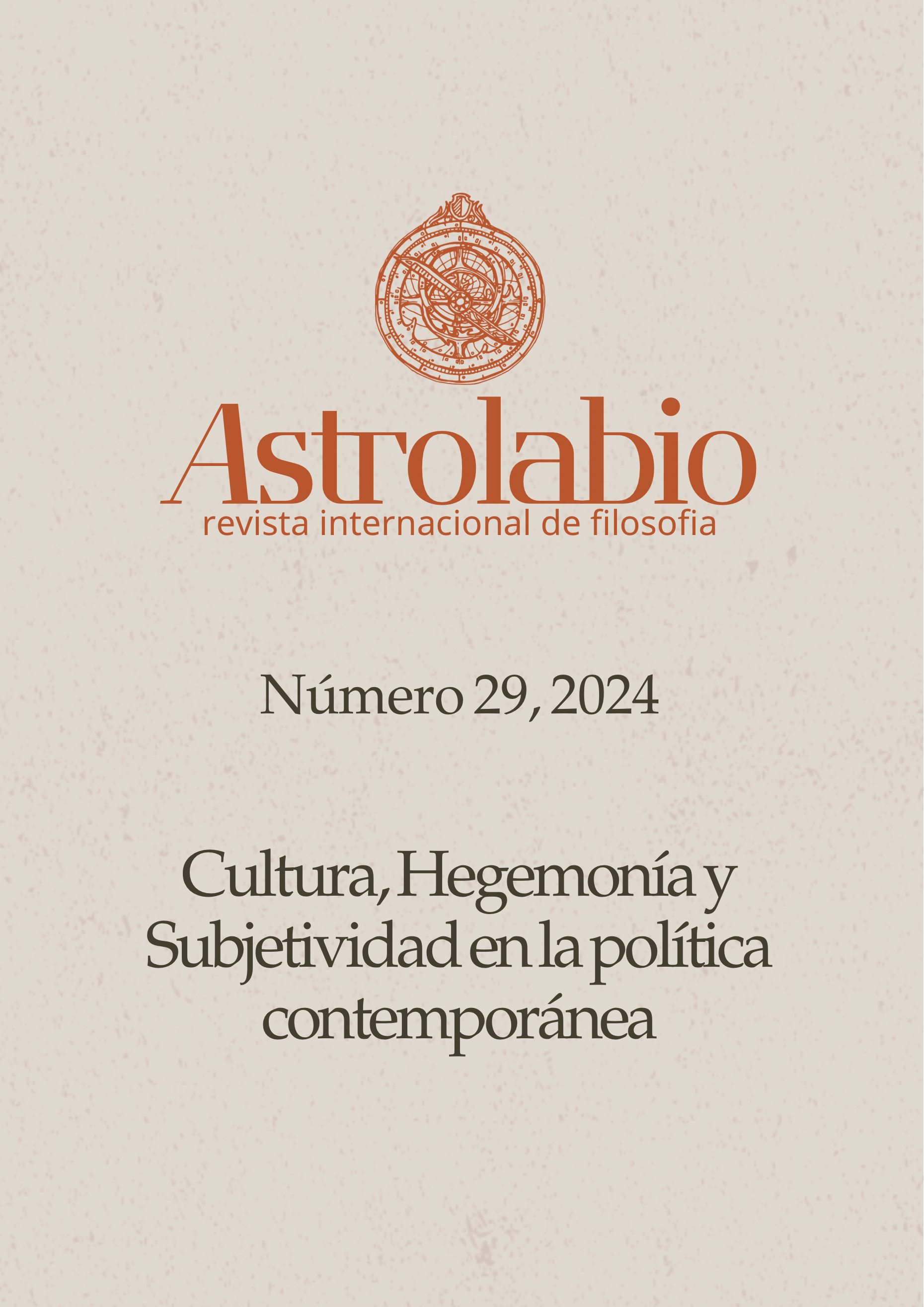Models of subjectivizing in the contemporary politics
DOI:
https://doi.org/10.1344/astrolabio.v1i29.47937Keywords:
Model of Subjectivizing, Transcendental Subject, Dialectical Subject, Hermeneutical Subject, Weak SubjectAbstract
In this article, I shall consider the theme of the modern and postmodern paradigm of reason and subject, and its emergence in the XXth century, within the framework of the contemporary politics. There are philosophers, like Descartes and Kant, that bring to philosophy the scientific model of the rationality with the aim to adapt it to the metaphysical problems. There are, however, philosophers, like Hegel, that try to preserve the nature of the philosophical rationality, that conceive through the dialectical rationality, and to renovate the dialectics itself. The subject, that thinks from those philosophical perspectives, is a transcendental one (Kantian), respectively, a dialectical one (Hegelian), that square with the two modern paradigms of the reason: the geometric reason and the dialectical reason. With Nietzsche and Heidegger, the hermeneutical reason goes into the philosophical scene and its sense will be the anti-paradigm of the modern reason, that will aim to emphasize a new human subject for the new challenges of the XXth century life. Vattimo proposes us the paradigm of the hermeneutical reason of the “weak subject”, carrying it to its logical conclusion the Nietzsche-Heidegger’s “forgot subject”. Along the cultural history of Europe, the human subject has projected himself in different ways, by the time or by the space, so we should have temporal paradigms of the subject and spatial paradigms of the subject. Nowadays, in the political space, the human subject acts through his model of subjectivizing and recognition of political reality.
References
BIBLIOGRAFÍA PRIMARIA
Descartes, R. (2010). Discurso del método. Meditaciones metafísicas. Edición y tradución de Manuel García Morente. Espasa Libros, S.L.U.
Hegel, G. F. W. (1971). Fenomenología del espíritu. México: Fondo de Cultura Económica.
Hegel, G. F. W. (2000). Rasgos Fundamentales De La Filosofía Del Derecho o compendio de derecho natural y ciencia del estado. Traducción directa del alemán: Eduardo Vásquez. Madrid: Editorial Biblioteca Nueva.
Hegel, G. F. W. (2005). Enciclopedia de las ciencias filosóficas en compendio. Edición, introducción y notas de Ramón Valls Plana. Madrid: Alianza Editorial.
Heidegger, M. (1997). Ser y Tiempo. Traducción, prólogo y notas de Jorge Eduardo Rivera C. Santiago de Chile: Editorial Universitaria.
Heidegger, M. (2011). Tiempo y ser. Introducción de Manuel Garrido. Traducción de Manuel Garrido, José Luis Molinuevo y Felix Duque. Quinta edición. Madrid: Tecnos.
Kant, I. (1997). Crítica de la razón pura. Prólogo, traducción, notas e índices: Pedro Ribas. Madrid: Santillana Ediciones Generales.
Kant, I. (1999). Prolegómenos a toda metafísica futura que haya de poder presentarse como ciencia (Edición bilingüe). Edición, traducción directa del alemán, comentarios y notas de Mario Caimi. Epílogo de Norbert Hinske. Madrid: Ediciones Istmo, S.A.
Kant, I. (2009). ¿Qué es la Ilustración? Y otros escritos de ética, política y filosofía de la historia. Edición de Roberto R. Aramayo. Madrid: Alianza Editorial.
Vattimo G. y Rovatti P. A. (eds.). (2006). El pensamiento débil. Quinta edición. Traducción de Luis de Santiago. Madrid: Ediciones Cátedra.
Vattimo, G. y Zabala, S. (2012). Comunismo hermenéutico. De Heidegger a Marx. Barcelona: Herder Editorial.
Zabala, S. (Ed.). (2009). Debilitando la filosofía. Ensayos en honor a Gianni Vattimo. Traducción de Francisco Javier Martínez Contreras. Barcelona: Anthropos Editorial.
BIBLIOGRAFÍA SECUNDARIA, OBRAS DE EXÉGESIS FILOSÓFICA
Cruz, M. (compilador). (1996) Tiempo de subjetividad. Barcelona: Paidós.
Kuhn, T. (2004) La estructura de las revoluciones científicas. Traducción de Agustín Contin. México: Fondo de Cultura Económica.
Marquard, Odo. (2001). Filosofía de la compensación. Estudios sobre antropología filosófica. Traducción de Marta Tafalla. Barcelona: Ediciones Paidós Ibérica.
Marquard, Odo. (2007). Dificultades con la filosofía de la historia. Traducción de Enrique Ocaña. Valencia: PRE-TEXTOS.
Martens, E. y Schnädelbach, H. (1999). Filosofie. Curs de bază/ Philosophie. Ein grundkurs. Traducere din limba germană coordonată de Mircea Flonta. București: Editura Științifică.
Mayos, G. (2007) (1988) La distinció subjecte-objecte en la filosofia de la história. Anuari de la Societat Catalana de Filosofia, pp. 129-137.
Mayos, G. (2007) (2004). Ilustración y Romanticismo. Introducción a la polémica entre Kant y Herder. Barcelona: Herder.
Mayos, G. (2007) (2012) Macrofilosofía de la Modernidad. dLibro. (Versión electrónica.)
Mayos, G. (2007). Hegel: Vida, pensamiento y obra. Barcelona: Planeta DeAgostini.
Oyarzún, P. (2001). La desazón de lo moderno. Problemas de la modernidad. Santiago: Cuarto Propio / Arcis (424 pp.). (Versión electrónica.) Contiene tres partes: I. “La desazón de lo moderno. Para una crítica de lo post” (1989), págs. 6-123; II. “Problemas de la modernidad”, págs. 124-235; y un “Addendum. Modernidad y posmodernidad: un debate” (1995), págs. 236-244.
Oyarzún, P. La desazón de lo moderno. Problemas de la modernidad. Filosofía universidad arcis / cuarto propio. (Versión electrónica.) Contiene dos conferencias: “Razón y modernidad”, Conferencia pronunciada en ILADES con ocasión del Seminario: Ciencia y filosofía: indagación sobre los umbrales de la racionalidad moderna, el 18 de agosto de 1989; y: “Ciencia e interés humano”, Conferencia en un ciclo organizado del Instituto de Filosofía de la P. Universidad Católica de Chile, junio de 1997, texto de octubre de 1993, noviembre de 1996.
Petrone, F. (2013) Comunismo hermenéutico: ¿una alternativa para los débiles? Astrolabio. Revista internacional de filosofía (14), pp. 99-106.
Rodriguez, R. Del sujeto y la verdad. Madrid: Editorial Síntesis.
Segura Naya, A. El Yo y su tiempo. (Versión electrónica.)
Valls Plana, R. (1994). (1981). La dialéctica. Barcelona: Montesinos.
Valls Plana, R. (1994). Del Yo al nosotros. Barcelona: PPU.
Downloads
Published
How to Cite
Issue
Section
License
Copyright (c) 2024 Leonard Picuș

This work is licensed under a Creative Commons Attribution 4.0 International License.
Total or partial reproduction of the works published in the Journal is permitted, provided the source is cited.
The copyright of the articles published in the Journal belongs to the authors, with first publication rights reserved for this journal. The articles will be distributed under the CC BY 4.0 license (Attribution 4.0 International).



